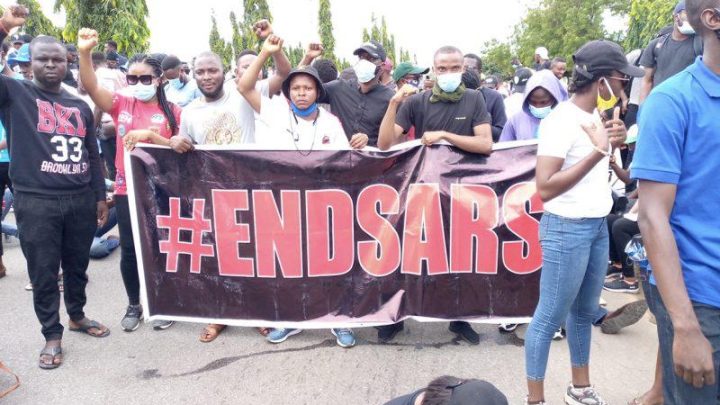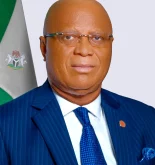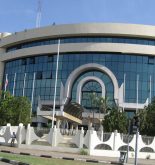The pervasive acts of police brutality in Nigeria
As Nigeria remembers the massacre of unarmed protesters at the Lekki Tollgate on Friday, the Tiger Eye Foundation is releasing a documentary titled “October 2020.” This documentary explores the ramifications of police brutality in the country.
Anas Aremeyaw Anas, the founder of Tiger Eye Foundation, shared in an exclusive interview with GuardPost Nigeria on Thursday that “October 2020” goes beyond the events at the Lekki Tollgate and Abuja.
“Our duty was to conduct a retrospective analysis of what happened and identify cases of police brutality across Nigeria, rather than focusing solely on Lagos and Abuja or other urban areas.
“We found that SARS (Special Anti-Robbery Squad) activities occurred in all parts of Nigeria. The main narrative made it appear as if the brutality was confined to Lagos, Abuja, and other major cities.
“Human rights abuse is human rights abuse; it doesn’t matter where a person resides. If someone was beaten, it means their rights were violated. In fact, some people in rural areas suffered the most.
“Our job was to move from the major cities into the hinterlands to investigate the atrocities that had been committed and their effects on the people. It is a comprehensive and holistic account of the suffering and abuse experienced by the people, rather than just a partial story. We are telling the whole story.”
Heartbreaking stories from victims
The award-winning undercover journalist mentioned that the team interacted with hundreds of people who shared their experiences of SARS atrocities. While Nigerians in cities were more likely to receive support when their rights were violated by law enforcement, the situation in rural areas was dire.
During the year-long inquiry, the team spoke to victims individually before compiling their stories into a collection that revealed what had happened across the country.
Anas continued, “If someone lost a limb in Lagos, that person is likely to receive more support, but those in the hinterland often receive none. Some of the people we spoke to didn’t even know about the #EndSARS protest.
“They didn’t know. All they knew was that they faced atrocities from security agencies, and whether there was a demonstration somewhere, they had no idea. That is what we did in ‘October 2020.’”
What are former #EndSARS coordinators are saying?
David Hundeyin, an investigative journalist and top #EndSARS coordinator, stated that the movement represented the long-awaited awakening of Nigeria’s youth-majority population.
“For those of us in the journalism field who had built our professional identity around holding power accountable, rather than acting as government stenographers, #EndSARS represented the long-awaited awakening of Nigeria’s youth-majority population,” Mr. Hundeyin began.
“The brutal response of the Nigerian state on October 20, 2020, and the subsequent impact on the lives and circumstances of hundreds of protesters, who were abducted and murdered by the state, or hounded into exile like I was, is well known.
“What is perhaps less discussed is that #EndSARS and the Tiananmen Square-esque response to it directly laid the foundations for an emerging new political paradigm in Nigeria and across West Africa.”
The founder of West Africa Weekly argued that young people under the age of 35, who make up the overwhelming majority of Nigeria’s population, now understand that a strong ideological alignment with pronounced decentralization of leadership and coordinating functions would yield a near-unbreakable political force.
Reflecting on what happened in October 2020, rights activist and one of the coordinators of the #EndSARS Movement, Rinu Oduala, said that the protest represented a fight against the oppressive forces that had stifled Nigeria’s progress for decades.
“#EndSARS was anger, frustration, trauma, pain, and tragic deaths, all within a single movement. It was a desperate struggle for life in the midst of senseless violence. It represented a fight against the oppressive forces that had stifled Nigeria’s progress for decades.
“The widespread killings, extortion, torture, sexual abuse, harassment, and the ever-present fear of ‘I will shoot you, and nothing will happen,’ raise the question, ‘Can such actions continue in any democratic nation without resistance?’” Ms. Oduala told GuardPost Nigeria.
She maintained that the struggle exacted heavy sacrifices on the youth: sweat, tears, blood, and unwavering courage. “It disrupted the lives we once knew, scattering us to strange lands, landing some in prison, and claiming the lives of others,” she said.
Another activist and #EndSARS Coordinator, Raphael Adebayo, said that, for the first time in Nigeria’s history, the #EndSARS protests revealed the possibilities for a new paradigm shift in Nigeria.
Mr. Adebayo, who is also an author, told GuardPost Nigeria, “From the embers of that mass action, three lessons stand out for me. The first is the indisputable power of peaceful mass actions.
“The #EndSARS protests revealed that oppressed and brutalized people anywhere can indeed come together to resist not just police brutality, but any form of dehumanization, tyranny, and indignity.
“The second lesson is that the #EndSARS protests arguably exposed more about the meaning of Nigeria and her ruling class than any other event in Nigeria’s contemporary history.
“In its scale, the atrocities of the Nigerian state during the #EndSARS protests, from Abuja to Lagos, particularly on October 20, 2020, were just as horrible as the Sharpeville Massacre of 1960—and that’s very instructive when considering both events in their full historical context.
“The final lesson from the #EndSARS protests that young Nigerians cannot ignore is that our job is not done. If anything, it has just begun.”
How the #EndSARS protest started
On October 8, 2020, nationwide protests against SARS, a rogue police squad, began following weeks of outrage and disgust with clips and photographs depicting police brutality, harassment, and extortion in several parts of Nigeria.
The protests were led by youth in many cities, along with numerous activists and celebrities. The #EndSARS protests began as a call to end police brutality and extrajudicial killings, which had become common in Nigeria.
Harassment and unfair treatment by the police remain prevalent, dating back to the military era when soldiers wrongfully arrested individuals and violated their fundamental rights. Most leaders of the #EndSARS Movement were chased into exile and have remained outside, fighting to restore sanity in the country.




